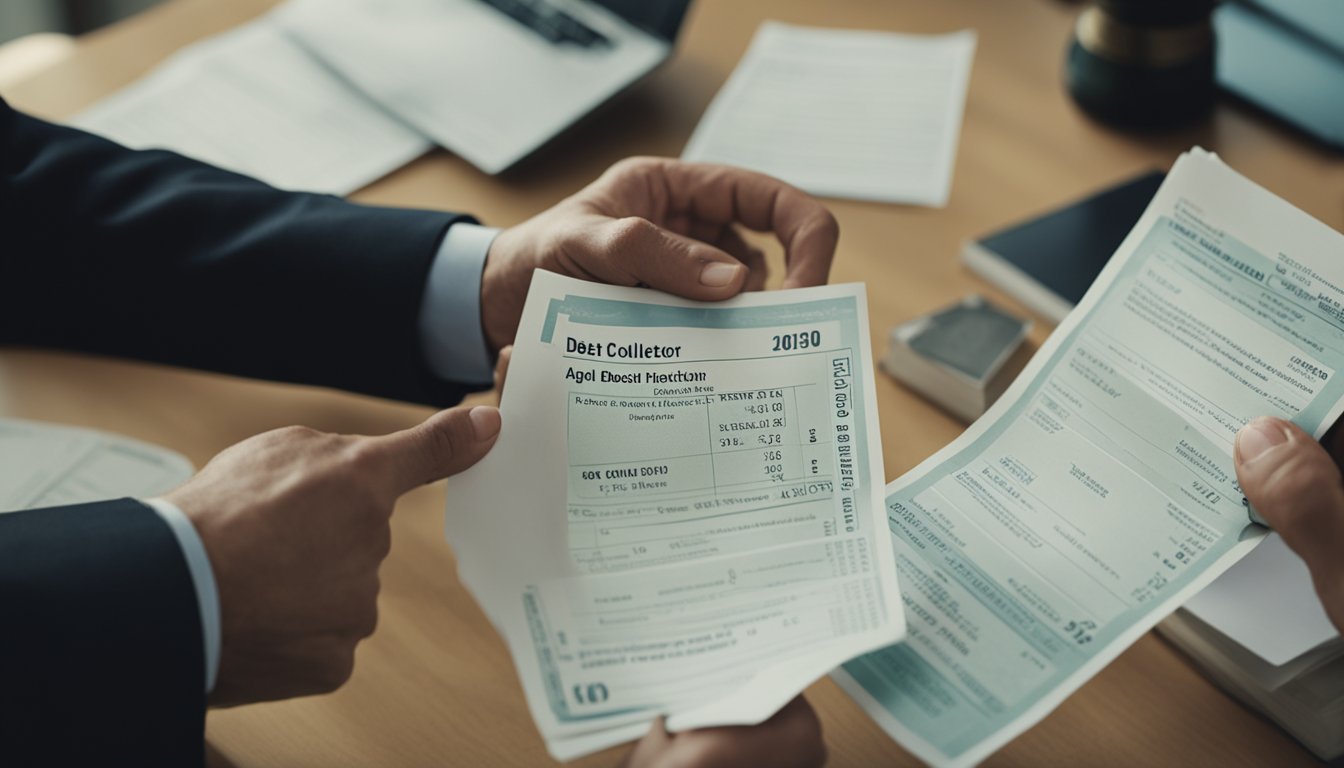If you’ve ever been in debt, you know how stressful it can be to receive calls and letters from debt collectors. Debt collectors are hired by creditors to recover outstanding debts from borrowers. While debt collectors play an important role in Singapore’s financial ecosystem, they must operate within the bounds of the law to protect the rights and dignity of debtors.

Understanding the legal and illegal practices of debt collectors in Singapore is crucial for both creditors and debtors. Debt collectors are prohibited from engaging in certain practices, such as using abusive language, threatening violence, or revealing a debtor’s debt to third parties. If you’re a debtor, it’s important to know your rights and what debt collectors can and cannot do under the law. If you’re a creditor, it’s important to hire a reputable debt collection agency that operates within the bounds of the law.
Key Takeaways
- Debt collectors are hired by creditors to recover outstanding debts from borrowers in Singapore.
- Debt collectors must operate within the bounds of the law and are prohibited from engaging in certain practices, such as using abusive language or threatening violence.
- Understanding the legal and illegal practices of debt collectors is crucial for both creditors and debtors in Singapore.
Understanding Debt Collection in Singapore

If you are a debtor or creditor in Singapore, it is important to understand the legal framework governing debt collection. Debt collection is the process of collecting unpaid debts from debtors, and it involves a complex set of laws and regulations. In this section, we will discuss the key aspects of debt collection in Singapore.
Legal Framework Governing Debt Collectors
In Singapore, debt collection is regulated by the Debt Collection Bill, which was passed in 2018. The legislation sets out the rules and regulations that debt collectors must follow when collecting debts. The bill also establishes the Credit Collection Association of Singapore (CCAS), which is responsible for enforcing the code of conduct and ethics for debt collectors.
Roles and Responsibilities
Debt collectors in Singapore have a responsibility to act ethically and professionally when collecting debts. They must follow the code of conduct and ethics established by the CCAS, which requires them to treat debtors with respect and dignity. Debt collectors must also ensure that they do not engage in any illegal or unethical practices, such as harassing debtors or using threats or intimidation.
Code of Conduct and Ethics
The CCAS has established a code of conduct and ethics for debt collectors in Singapore. The code sets out the standards of behaviour that debt collectors must adhere to when collecting debts. Some of the key provisions of the code include:
- Treating debtors with respect and dignity
- Not using threats or intimidation to collect debts
- Not disclosing information about the debtor to third parties without their consent
- Not engaging in any illegal or unethical practices
Debt Collection Entities in Singapore
There are several types of debt collection entities in Singapore, including registered debt collection agencies, licensed moneylenders, merchant banks, licensed credit card or charge card issuers, exempt moneylenders, licensed insolvency practitioners, regulated legal practitioners, joint law ventures, licensed foreign law practices, qualifying foreign law practices, and Singapore law practices. Each of these entities is subject to different regulations and requirements when collecting debts.
Protection and Support for Debtors
In Singapore, debtors have several forms of protection and support when dealing with debt collectors. The Protection from Harassment Act (POHA) provides legal protection against harassment by debt collectors, while the Consumer Association of Singapore (CASE) provides support and advice to debtors who are experiencing financial difficulties. Additionally, debtors can seek advice from a lawyer or seek assistance from a debt counsellor if they are struggling to repay their debts.
Overall, debt collection in Singapore is a complex and highly regulated process. If you are a debtor or creditor, it is important to understand your rights and responsibilities under the law. By following the code of conduct and ethics established by the CCAS, debt collectors can ensure that they operate within the bounds of the law and protect the rights and dignity of debtors.
Prohibited Debt Collection Practices

When it comes to debt collection activities in Singapore, there are certain practices that are prohibited by law. Debt collectors must adhere to strict guidelines and regulations to ensure that they do not engage in any illegal practices that may cause distress, alarm, or even violence to the debtor. In this section, we will discuss some of the prohibited debt collection practices in Singapore.
Harassment and Intimidation
Debt collectors are not allowed to harass or intimidate debtors in any way. This includes making threats of violence, vandalism, or any other form of unlawful stalking. Debt collectors are also prohibited from engaging in any form of unlawful assembly or disrupting the peace. Under the Penal Code, debt collectors who engage in these activities may be charged with defamation, which carries a maximum sentence of two years in prison.
Unlawful Acts
Debt collectors must not engage in any unlawful acts when collecting debts. This includes breaking into the debtor’s home or office, stealing property, or using force to collect debts. Debt collectors are also not allowed to use video recording or social media to shame or embarrass debtors. If a debt collector engages in any of these unlawful acts, the debtor can seek legal recourse and file a complaint with the police.
Privacy Violations
Debt collectors must respect the privacy of the debtor. They are not allowed to disclose the debtor’s personal information to third parties without the debtor’s consent. Debt collectors are also not allowed to impersonate government bodies such as IRAS or the police. If a debt collector violates the debtor’s privacy, the debtor can apply for a protection order or an expedited protection order against the debt collector.
Impersonation and Misrepresentation
Debt collectors must not engage in any form of impersonation or misrepresentation when collecting debts. This includes pretending to be a lawyer, a government official, or a representative of a credit bureau. Debt collectors are also not allowed to misrepresent the amount owed or the consequences of non-payment. If a debt collector engages in any form of impersonation or misrepresentation, the debtor can seek legal recourse and file a complaint with the police.
In conclusion, debt collectors in Singapore are subject to strict guidelines and regulations to prevent illegal debt collection practices. If you feel that a debt collector has engaged in any of the prohibited practices mentioned above, you can seek legal recourse and file a complaint with the police.
Legal Recourse and Enforcement

If you feel that a debt collector has violated your rights or engaged in illegal practices, you have several legal options for recourse and enforcement. Here are some of the steps you can take:
Reporting and Police Involvement
You can report any illegal actions by debt collectors to the police, who may investigate and take legal action against the debt collector. You can also file a police report if you feel that you are being harassed or threatened by a debt collector. The Ministry of Home Affairs has guidelines on what constitutes harassment and threats, which can be used as a reference.
Legal Actions Against Debt Collectors
You can also take legal action against debt collectors who violate your rights. You can file a civil lawsuit against the debt collector for harassment, and if successful, you may be awarded damages. You can also apply for a writ of seizure and sale against the debt collector’s assets. In addition, you can engage a lawyer to represent you in legal proceedings against the debt collector.
Consumer Protection and Advocacy
If you need help with debt-related issues, you can seek assistance from the Consumer Association of Singapore (CASE). CASE provides information and advice on debt management and consumer protection, and can also mediate disputes between debtors and creditors.
Regulatory Actions and Penalties
Government bodies such as the Ministry of Law and the Registry of Moneylenders regulate debt collection practices in Singapore. Debt collectors who violate the Moneylenders Act or engage in illegal practices may face suspension, fines, or other penalties. The Credit Collection Association of Singapore (CCAS) also has a code of conduct that debt collectors must adhere to. If a debt collector violates this code, you can make a complaint to the CCAS.
In summary, if you feel that a debt collector has engaged in illegal practices, you have several legal options for recourse and enforcement. You can report the debt collector to the police, take legal action against them, seek assistance from consumer protection agencies, or make a complaint to regulatory bodies. Remember that debt collectors must adhere to strict guidelines and regulations, and you have the right to protect yourself from harassment and illegal practices.
Best Practices for Debt Repayment

If you have debt, it is important to come up with a repayment plan that works for you. Here are some best practices to help you repay your debt in a manageable way.
Negotiating Repayment Terms
If you are struggling to make your payments, it is important to contact your creditor as soon as possible to discuss your options. You may be able to negotiate a repayment plan that works for both you and your creditor. This could involve reducing your interest rate, extending the repayment period, or agreeing to a lower monthly payment.
When negotiating repayment terms, it is important to be honest about your financial situation. Your creditor may be more willing to work with you if they understand your circumstances. Be sure to also read and understand the terms of any new repayment plan before agreeing to it.
Debt Consolidation Options
If you have multiple debts, consolidating them into one loan may make it easier to manage your payments. Debt consolidation involves taking out a new loan to pay off your existing debts, leaving you with one monthly payment to make.
There are several options for debt consolidation in Singapore, including personal loans, balance transfer credit cards, and debt consolidation plans offered by banks and licensed moneylenders. It is important to compare the interest rates and fees of each option before choosing one.
Debt consolidation can be a useful tool for managing your debt, but it is important to remember that it does not reduce the amount owed. You will still need to make payments on the consolidated loan in order to repay your debt.
By negotiating repayment terms and considering debt consolidation options, you can create a repayment plan that works for you and helps you manage your debt in a manageable way.
Preventive Measures for Creditors

As a creditor, it is important to take preventive measures to avoid the need for debt collection. Assessing the debtor’s ability to pay and setting clear contract terms can help prevent the need for debt collection agencies.
Assessing Debtor’s Ability to Pay
Before lending money, it is important to assess the debtor’s ability to pay. You should request financial statements and credit reports to verify the debtor’s income and creditworthiness. This can help you determine if the debtor is likely to default on the loan.
Setting Clear Contract Terms
Setting clear contract terms is essential to avoid disputes with debtors. The contract should include the amount of the loan, interest rate, repayment schedule, and any penalties for late payments. It should also specify the consequences of defaulting on the loan, such as the use of debt collection agencies.
To ensure that the contract is legally binding, it is important to comply with the regulations for lending money. The creditor should be fit and proper and comply with the statute of limitations. This can help prevent legal disputes with debtors and avoid the need for debt collection agencies.
In summary, taking preventive measures such as assessing the debtor’s ability to pay and setting clear contract terms can help prevent the need for debt collection agencies. By complying with regulations and setting clear terms, creditors can avoid legal disputes and maintain good relationships with their debtors.
Impact of Debt Collection on Society

Debt collection is a legitimate economic activity in Singapore and is crucial to facilitate the money lending business. However, it can also have a significant impact on society. In this section, we will discuss the economic and social implications of debt collection.
Economic Implications
Debt collection companies or businesses can be a nuisance for debtors who are already in trouble. Debtors who are persecuted by debt collectors can face severe financial consequences, such as wage garnishment or bank account levies. This can lead to a further decline in their financial status, making it difficult for them to meet their basic needs.
Moreover, some debt collection practices can also have a negative impact on the economy. For instance, if debt collectors use illegal or unethical tactics to collect debts, it can lead to a decrease in consumer confidence. This can, in turn, lead to a decrease in spending and investment, causing a ripple effect on the economy.
Social Consequences
Debt collection can also have social consequences. Debtors who are constantly harassed by debt collectors can suffer from stress, anxiety, and depression. This can have a negative impact on their mental and physical health and can affect their relationships with family and friends.
Furthermore, some debt collectors may use aggressive tactics, such as threats and physical violence, to collect debts. This can lead to a breakdown in social order and can create a sense of fear and insecurity in society.
In conclusion, debt collection is a legitimate economic activity in Singapore, but it is essential to ensure that it is conducted in a lawful and ethical manner. It is important to strike a balance between the needs of debt collectors and debtors to ensure that the economy and society as a whole can thrive.
Frequently Asked Questions

What are the legal boundaries for debt collectors’ actions in Singapore?
Debt collectors in Singapore are required to adhere to the guidelines set by the Credit Collection Association of Singapore (CCAS). They are not allowed to engage in any actions that cause embarrassment, harassment, or alarm to the debtor. Debt collectors are not allowed to threaten, use abusive language, or physically harm the debtor. They are also not allowed to disclose the debt to third parties, except for the debtor’s spouse, immediate family members, or legal representatives.
How can I identify if a debt collector is officially licensed in Singapore?
Licensed debt collectors in Singapore are required to display their license number on all their official documents, including demand letters and receipts. You can also verify the license number on the Ministry of Law’s website. If you are unsure about the legitimacy of a debt collector, you can contact the CCAS or the Ministry of Law for assistance.
What steps should I take if I’m experiencing harassment from a debt collector?
If you are experiencing harassment from a debt collector, you should immediately inform them that their actions are unacceptable and request that they stop. You can also make a complaint to the CCAS or the Ministry of Law. If the debt collector’s actions constitute an offence under the Protection from Harassment Act, you may also apply for a Protection Order or an Expedited Protection Order against the debt collector and/or the creditor.
What’s the duration before a debt is considered non-collectable in Singapore?
In Singapore, the duration before a debt is considered non-collectable depends on the type of debt. For unsecured debts, the limitation period is six years from the date the debt became due. For secured debts, the limitation period is 12 years from the date the debt became due.
How can one lodge a complaint against aggressive debt collection tactics?
If you are a victim of aggressive debt collection tactics, you can lodge a complaint with the CCAS or the Ministry of Law. You should provide as much evidence as possible, including recordings, letters, and emails. The CCAS or the Ministry of Law will investigate the complaint and take appropriate action against the debt collector if necessary.
Are audio recordings by debt collectors permissible during collections?
In Singapore, debt collectors are allowed to make audio recordings during collections, as long as they inform the debtor that they are being recorded. However, debt collectors are not allowed to use the recordings for any other purpose than debt collection.

